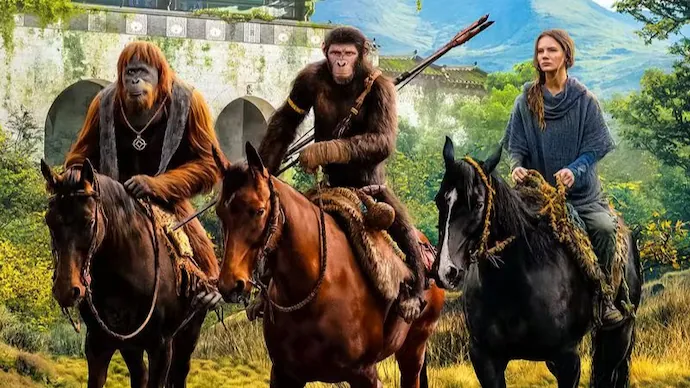In a time where reboots and remakes dominate the entertainment landscape, it’s rare to see a film that not only honors its origins but also pushes the envelope of its genre. Enter Kingdom of the Planet of the Apes, the latest chapter in the iconic Planet of the Apes series. With a history spanning over five decades, this movie doesn’t just aim to be a fresh start—it seeks to evolve the saga to new heights.
For fans and newcomers alike, Kingdom of the Planet of the Apes strikes a balance between breathtaking visuals, a compelling narrative, and a deep exploration of themes that resonate with modern audiences. The film is an embodiment of evolution, not just in its storyline but in its filmmaking, proving that this franchise still has much to say and show. Let’s break down why Kingdom of the Planet of the Apes is not just another blockbuster, but a landmark in modern science fiction.
The Legacy Continues: Revisiting the World of the Apes
Before diving into the new installment, it’s crucial to understand the rich cinematic history that precedes Kingdom of the Planet of the Apes. The original Planet of the Apes (1968) set a precedent for what science fiction could achieve. It wasn’t just about apes overthrowing humans; it was a commentary on human nature, politics, and society. Since then, the franchise has spawned sequels, TV shows, reboots, and, of course, the critically acclaimed prequel trilogy that revitalized the series in the 2010s.
Kingdom of the Planet of the Apes takes place after the events of War for the Planet of the Apes (2017), but it stands on its own. Gone is the world we once knew—a society governed by apes is now the new normal. With Caesar’s legacy looming large, the movie explores the next chapter in the rise of ape civilization, while also delving into the potential perils of their newfound dominance. But what really sets this film apart is its ambition to blend the epic and the intimate, from grand battle sequences to personal struggles that drive its characters forward.
A Story of Survival and Power Struggles
At its core, Kingdom of the Planet of the Apes is a tale about survival, adaptation, and power struggles—not just between species but within them. Following Caesar’s death, the ape society is fractured, and the balance of power is fragile. The movie explores the complex dynamics of leadership as various factions vie for control, with some apes advocating for peace, while others push for a more aggressive, authoritarian rule.
The film introduces new leaders within the ape ranks, each representing different ideologies. This internal conflict creates a narrative tension that drives much of the plot. The apes’ struggle isn’t just about maintaining power; it’s about finding a way to coexist, either with the remnants of humanity or with each other.
Meanwhile, the human population—now a fraction of what it once was—tries to survive in a world that no longer belongs to them. The few remaining humans are faced with impossible choices: continue fighting or learn to live under the shadow of their new rulers. This dynamic creates a compelling backdrop of political intrigue and moral dilemmas that resonates deeply in today’s world, where survival and leadership often seem at odds.
New Characters, Same Emotional Depth
Kingdom of the Planet of the Apes doesn’t just rely on the legacy of past characters like Caesar to carry the story. Instead, it introduces a new generation of apes and humans, each with their own emotional arcs and moral complexities. While Caesar’s shadow looms large, it’s the new characters that bring fresh energy to the narrative.
One standout is the film’s new protagonist, a young ape leader who grapples with the responsibilities of leadership in the aftermath of war. His arc is one of internal conflict—he must decide whether to follow in Caesar’s footsteps or carve his own path in this new world. This character embodies the age-old debate between idealism and pragmatism, a conflict that resonates throughout the film.
On the human side, the introduction of a female scientist adds a layer of complexity to the human-ape dynamic. Her character is torn between loyalty to her species and a growing understanding of the apes’ society. Her journey, full of tension and moral dilemmas, helps humanize the conflict and presents the audience with a nuanced perspective on what it means to survive in a world you no longer control.
Visuals That Push the Boundaries of Cinema
From the very first frame, it’s clear that Kingdom of the Planet of the Apes sets a new standard for visual storytelling. The film’s directors and cinematographers have pushed the boundaries of what CGI can achieve, creating apes that are almost indistinguishable from their real-world counterparts. Each fur strand, facial expression, and movement is so meticulously rendered that the apes feel not only believable but deeply relatable. It’s a stunning achievement in visual effects, reminiscent of the work done in the previous trilogy but elevated to new heights.
The landscapes are equally impressive. The film masterfully contrasts the decayed remnants of human civilization with the thriving, untamed wilderness that the apes now call home. The visuals not only serve as a backdrop but also help convey the themes of evolution, survival, and the rise and fall of empires. One minute, viewers are immersed in dense, jungle-like environments that emphasize the apes’ connection to nature, and the next, they are thrust into the cold, crumbling remains of human cities, highlighting the downfall of mankind.
The film’s action sequences are also nothing short of breathtaking. From intense close-quarters combat to large-scale battles, the film doesn’t shy away from showing the brutality of a world in conflict. Yet, amidst the chaos, there are quieter moments that allow the visuals to speak for themselves—whether it’s an ape mourning the loss of a comrade or a human survivor contemplating their next move. The visuals never feel gratuitous but rather serve to enhance the emotional weight of the story.
Themes That Resonate in Today’s World
While Kingdom of the Planet of the Apes is set in a fictional future, the themes it explores feel remarkably relevant. The film delves into questions of leadership, morality, and coexistence, reflecting the anxieties of a world grappling with division and the consequences of unchecked power. The apes’ struggle to build a new society mirrors real-world issues such as political polarization, environmental destruction, and the consequences of humanity’s impact on the natural world.
One of the most compelling themes is the exploration of what it means to be “civilized.” The apes, once seen as the epitome of primitive life, have evolved into a sophisticated society with their own politics, culture, and morality. Yet, their advancement raises difficult questions about whether they are truly different from the humans they replaced. This exploration of the fine line between civilization and savagery is a powerful commentary on human nature, one that echoes the philosophical debates sparked by the original 1968 film.
The film also touches on the inevitability of change and the cyclical nature of history. Just as humanity fell from its dominant position, the apes now face their own internal divisions and the possibility of repeating the same mistakes. It’s a sobering reminder that no society—no matter how powerful—is immune to the forces of change and decay.
A Soundtrack That Amplifies the Drama
The musical score in Kingdom of the Planet of the Apes plays a crucial role in building tension and enhancing the emotional stakes of the film. The soundtrack seamlessly blends orchestral arrangements with more atmospheric tones, creating an immersive auditory experience that complements the visual grandeur on screen. At moments of high tension, the score swells with intensity, while during quieter, more introspective scenes, it fades into the background, allowing the emotions of the characters to take center stage.
A Thought-Provoking Conclusion
Kingdom of the Planet of the Apes is more than just a continuation of a beloved franchise; it’s a thought-provoking, visually stunning, and emotionally resonant piece of cinema. The film masterfully builds on the themes of its predecessors while introducing new layers of complexity, both in its story and its characters. Its exploration of leadership, survival, and the costs of power feels deeply relevant, making it more than just a spectacle but a reflection of the world we live in today.
For longtime fans of the series, the film offers plenty of callbacks and emotional payoffs. But even for those new to the Planet of the Apes universe, this movie stands as a compelling and engaging narrative in its own right. With its mix of stunning visuals, complex characters, and resonant themes, Kingdom of the Planet of the Apes cements itself as one of the most ambitious and rewarding entries in modern science fiction.
If you’re looking for a movie that combines action, emotion, and deep philosophical questions about the nature of society, look no further. This film is a triumphant return to form for the Planet of the Apes franchise, and it leaves audiences eagerly anticipating what’s next in this epic saga.





